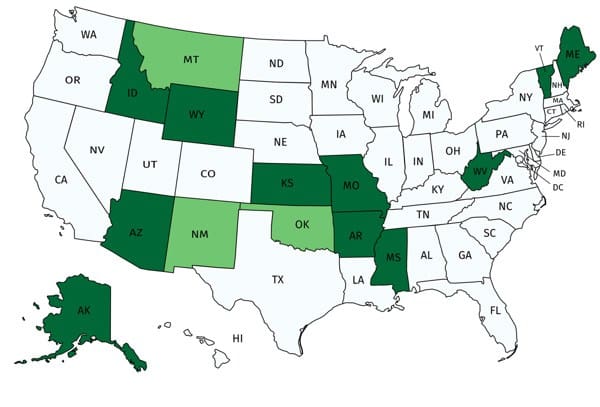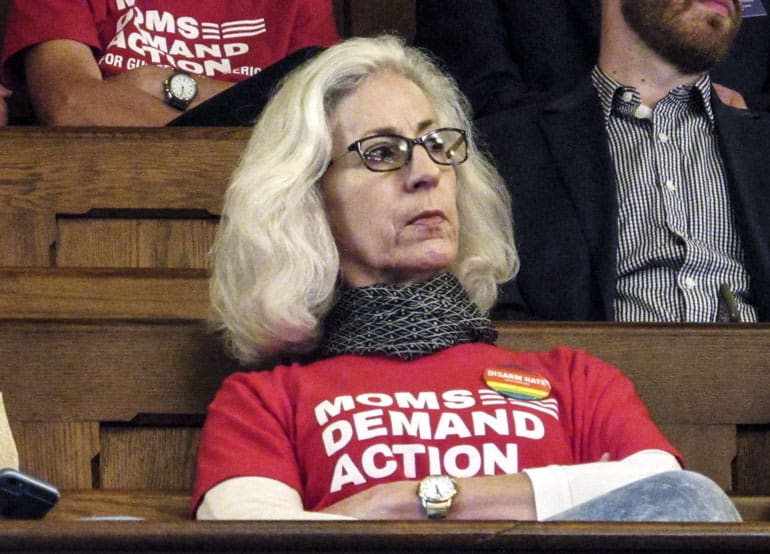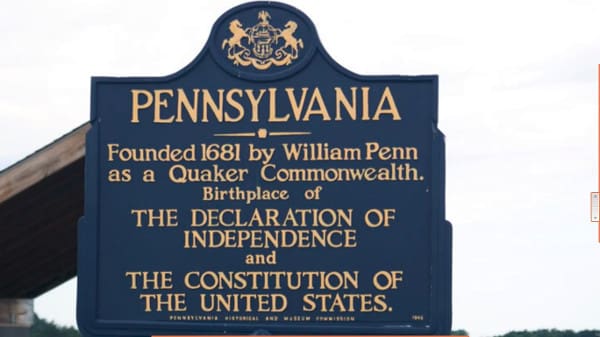By MarkPA
One of the most hotly debated issues on the Second Amendment is over the right to carry firearms outside the home. Today, each of the 50 states as well as the District of Columbia authorizes ordinary citizens to carry a handgun in most public places under one of the following three regimes:
- Constitutional Carry: 12 states
- Shall-Issue permit: 30 states and DC
- May-Issue permit: 8 states
The debate has lately been inflamed by reports of Florida’s failure to fully complete background checks on 365 applications. But no regulatory scheme can be perfect. Instead, let’s consider what path to take to resolve the right to carry question.
The Constitutional Carry states (except for Vermont) came to their regulatory conclusion after several years running Shall-Issue permitting systems. They had found that there was little to no benefit commensurate with the cost of enforcement of permitting requirements. When law enforcement officers encounter gun carriers under suspicious circumstances, they can run instant background checks to determine that the carriers are within their Constitutional rights to possess firearms.
So far, none of these states has reverted to its previous Shall-Issue scheme. Of these 12 states, eleven continue to issue permits to those who apply, primarily to facilitate their residents’ carrying while traveling in other states under the terms of the latter’s laws. Vermont, a state with the most liberal attitude toward gun carry, has made no move to develop a permitting regime since 1776.
Thirty states, recently joined by the District of Columbia, have adopted Shall-Issue laws. Under the Shall-Issue regime, a permit is generally required to carry a handgun in public which “shall” be issued to any applicant who meets the requirements prescribed by each jurisdiction. The least rigorous requirement is simply passing a NICS background check through the FBI. The most rigorous requirements add additional background checks, finger printing, training, testing and/or live fire qualification.
Only eight states still issue permits on a May-Issue basis. Of these, a couple are fairly liberal, at least in some counties, about issuing permits to qualified applicants. The others are more restrictive, issuing permits exclusively to individuals engaged as security personnel, retired law enforcement officers, personal friends of influential public officials, generous contributors to the entrenched political party, judges, prosecutors or celebrities. The criteria for issuance in these states are highly opaque and information isn’t readily available showing who has been issued permits or why.
Gun rights advocates have pursued two lines of attack on the May-Issue regimes of these states. One approach is to litigate in state and then federal courts for rulings that applicants who meet objective standards prescribed by the state have the right to be issued permits. The District of Columbia was the latest to be sued and the dispute was settled in that way by the Federal Circuit Court for the District of Columbia. It ruled that the “average citizen” had a right to be issued a permit. D.C. considered appealing to the Supreme Court but decided to accept the decision for fear of an adverse and nationally applicable ruling.
We don’t know what the future holds for litigation attacking May-Issue regimes. The Supremes have declined to grant cert on appeals from the Second, Third, Fourth and Ninth Circuits and it is not known why. Perhaps no case has been framed narrowly enough that five justices are prepared to take the next step. Justices should be reluctant to rule on the number and rigor of prerequisites such as training, testing or live fire qualification scores. The question of “need” itself is the big issue. Is it constitutional for a state to base carry decisions on any definition of “need”?
The alternative path is political, that is, for Congress to pass a National reciprocity bill. On the pro side, Congress has already passed national reciprocity laws affecting two classes of beneficiaries. The first, in 1993, covered armored car drivers while actively engaged in service of their employers. The second, in 2004, covered police and prison guards whether they are actively employed, disabled or retired with 10 years of service. The precedents support Congress exercising its power to supersede the states’ individually regulating firearm carry in public places.
The con side is primarily the Democrat Party advocating for, surprisingly, states’ rights, while complaining about a “race-to-the-bottom” in permitting requirements. For example, the State of New York has no wish to have visitors from Vermont carrying handguns in its territory who have never been subjected even to a NICS background check. Each state would be compelled to accept the standards of their 49 sister states, including no standards at all.
The U.S. House of Representatives passed H.R. 38, the Concealed Carry Reciprocity Act of 2017, but this bill has stalled in the Senate. To clear the Senate, it would need to clear the 60 vote filibuster rule. That could happen in only three ways: 1) abandoning the filibuster rule, 2) attaching the National Reciprocity bill to some other must-pass legislation like national defense funding, or 3) a sufficient increase in the number of Senators from right-to-carry states.
There are 42 such states, but of the 80 senators representing them, fewer than two-thirds support national reciprocity. It’s doubtful that sufficient turnover will occur in the 2018 election to pass national reciprocity. The possibility is greater by 2020. Should the gun-rights movement grow, it’s inevitable that national reciprocity will become law in time.
What is the way forward to achieve nationwide right-to-carry? Ideally, perhaps, each May-Issue state will ultimately adopt the same right-to-carry standards now in effect in 42 other states. But it may come that a newly appointed judge to the Supreme Court will call that shot in the nearer future. Or Congress and the President could legislate it, no doubt inviting court challenges up to the Supreme Court.
However it happens, it will come none too soon. “The people’s right to keep and bear arms, shall not be infringed” gives no excuse for cryptic decisions by states that arbitrarily limit that right.
MarkPA is trained in economics, a life-long gun owner, NRA Instructor and Massad Ayoob graduate. He is inspired by our inalienable rights to “life, liberty and the pursuit of happiness” and holds that having the means to defend oneself and one’s community is vital to securing them.
This post was originally published at drgo.us and is reprinted here with permission.





Yeah, for the umpteenth time, Arkansas is NOT a constitutional carry state.
“When law enforcement officers encounter gun carriers under suspicious circumstances…” Will the officers be required to articulate a reasonable suspicion someone is NOT eligible to carry a gun before running a background check?
There is some recent state level authority that a person cannot be detained for the purpose of determining whether he has a permit to carry a concealed firearm.
And there are other cases (Fourth Circuit Court of Appeals) which have ruled that mere possession of a firearm IS probable cause for all sorts of nefarious intrusions.
https://www.thenewamerican.com/usnews/constitution/item/25261-court-rules-that-those-carrying-concealed-are-presumed-to-be-dangerous
D.C., as was Illinois, was dragged kicking and screaming into a “shall issue” regime. So will California, if it ever comes to that, but it will take the Supreme Court to do it, since the Ninth Circuit has held that there is no constitutional right to a concealed weapons permit, a conclusion it came to notwithstanding that one cannot legally open carry in the State except in non-urban areas, leaving the issue of open carry to another case (which is under submission but was argued by an incompetent in pro per plaintiff who is convinced of his infallibility). Moreover, California is schizophrenic about its issuance policies, since they are set on a county sheriff by county sheriff basis. In my part of the state, it is virtually “shall issue,” while others it is either no issue (SF) (no cause is good enough) or virtually no issue (LA).
Don’t lump all of the sf bay area in with sf.. go across the bay and it is the fourth type of carry.. that is ‘may issue if you bribe the sheriff enough’ like in contra costa. or you are in his ‘mounted posse’.. yes, that actually exists. just another bribery method
Well, I wrote my Senators when the House bill passed, explaining, in careful detail, the logic of why National Reciprocity would, at worst, be a net positive for my state. They duly ignored me; I think one never responded, the other responded with some form letter about how much she hates bump stocks.
I honestly don’t get how they could be so in line with the DNC that they can’t even consider the cost/benefit equation for their own constituents. Any state that is a no-training, shall-issue for residents and non-residents state, like mine, has absolutely nothing to lose from national reciprocity. We also have “Constitutional” open carry (or unlicensed, or whatever), also for residents and non-residents. So literally anyone who can legally own a gun in the US can carry it here.
One of the arguments I have heard was ” How will the police know the good guys from the bad guys if everyone can carry a gun”. My answer, the bad guy will be doing something illegal just like they do know. Well duh !
I’ve heard that argument too on several occasions. If a person is involved in a defensive shooting, ideally the firearm is reholstered by the time the police arrive and they’ve given a complete description of themself to the 911 dispatcher including a detailed description of their clothing and made it clear to the dispatcher that they are not an aggressor.
The essential issue in the gun debate isn’t whether some guns and/or magazines are bad or whether or not one “needs” a firearm. The issue is what gives a person the right to feel free and empowered to make personal decisions for any other person or group of people besides their own underage minor children for whom they’re legally responsible until age 18.
It always irritates me when Senators respond to letters telling me what they think. I really don’t CARE what THEY think. Their job is to act on what WE think!!
Me as well. I’m in Virginia and was writing letters (email) about it to my senators (Kaine and Warner), with the first to Kaine since he is the more hardcore anti. I explained that Virginia already accepts ALL 50 + D.C. CCW carriers so there was zero reason for him to be against it. I also explained my personal reasons for wanting it passed; I am originally from N.Y. and have family there, who happen to struggle financially and can’t live in fancy safe neighborhoods and that when ever I go to visit, I have to choose to gamble with either our safety, our my freedom. Within one day I got a cookie cutter response explaining his stance on gun control: ban assault weapons, ten round max magazines, universal background checks, and on and on. But not in one single word did it address national reciprocity or my personal story. The only part of the entire letter that had anything to do with myself or concern was “Dear Mr. D****,” And they wonder why we don’t take them seriously.
Damn I wish Nick Fritas (sp?) won our primary.
12 + 30 + 8 = 50
There are 50 states and one district. You’re missing something.
Also New Hampshire is a constitutional carry state. Your map is out of date.
Two big errors in the first paragraph does not bode well for the article.
“The people’s right to keep and bear arms, shall not be infringed”
I think maybe you should have looked that up before quoting it.
Ironicatbest would say:”You already have the right to carry if your a citizen of the United States of America. Permission slips are for third graders needing to go potty.”
you’re
If illegal Mexican hordes would trade a lifetime guarantee to vote demtard for the right to carry we likely would see national reciprocity within days.
Is it constitutional for a state to base carry decisions on any definition of “need”? Ummmm NO.
Thanx for the spell check. For a bit there I was WTF in on you’re, then the bell rang
“…personal friends of influential public officials, generous contributors to the entrenched political party…”
We’re all friends here; you can call them Democrats, since every last one of them are.
I am fond of pointing out that I have been more thoroughly investigated for my carry permit than my drivers license. Yet my drivers license is good in all 50 states, and cars kill more people than guns every year.
I’m against national reciprocity. The reason is that sooner or later we are going to get a leftist congress and senate and they will use national reciprocity as a way to limit carry options for citizens to the state with the MOST restrictions such as for example Hawaii or New Jersey and then force ALL states to follow that example.
Suppose national reciprocity passes and is enacted (I can dream can’t I?). Then a leftist congress comes along and repeals the law, overnight, no exceptions. There are now potentially millions of American citizens minding their own business moving freely from state to state who would risk becoming felons. Don’t you think the courts would step in quickly? Suppose the courts agree with congress, what does that mean for law enforcement personnel and armored car drivers? The way I see it is that national reciprocities only uphill battle is big anti-gun money and timid congress critters. Trying to repeal it later and get a court, including SCOTUS, to agree that repeal (and by definition lesser civil liberties) is the right thing to do is going to be even harder.
“The Supremes have declined to grant cert on appeals from the Second, Third, Fourth and Ninth Circuits and it is not known why. Perhaps no case has been framed narrowly enough that five justices are prepared to take the next step.”
It takes four justices to grant certiorari, not five. However, you may still be correct that because there have not been five reliable votes, one or more of the four solid gun-rights supporters may have declined to take a case rather than risk Kennedy going all wonky.
We can thank Justice Thomas for writing outraged dissents in a couple of those decisions against certiorari. They provide an excellent framework and justification for the court to start taking these cases once the time is right.
And of course, Kennedy’s retirement could be a game-changer. Assuming we get another Gorsuch-type justice, that should mean that there is little risk of losing one of these cases.
The MOST IMPORTANT thing to keep in mind: If one of these cases came up with Kennedy casting the fifth dissenting vote, that would be FAR worse than waiting a year or two for a much more certain outcome. Losing one of these right-to-carry cases would set back liberty and freedom for at least a generation, if not more.
There is only 1 “Constitutional Carry” state – Vermont. The other 11 mentioned are “Permitless Carry”, which means they each have restrictions of one sort or another that excludes them from true “Constitutional” carry. And even Vermonters have to abide by Federal restrictions regarding Federal property.
Untrue. NH became a constitutional carry state on February 22, 2017. As an aside, the map is incorrect: if you count the dark green “constitutional carry” states, there are only 11; NH makes it 12 as mentioned in MarkPA’s article.
Kentucky is a hybrid. We have had state constitution protected open carry with no permit since we became a state.
The primary reasons many states resist “Constitutional Carry” over “Shall/Must Issue” has nothing to do with safety, background checks, cooling periods, etc, ad nauseum. It is money, pure and simple. Permits/licenses will cost the permit holder a fee that will also be renewable in the future, time and again. To allow one to carry simply because it is one’s stated God-provided right brings no money to the state coffers.
I want 50 state constitutional carry. With us reclaiming the Supreme Court it could happen. It’s more likely to happen if the ancient and notorious RBG leaves the court. Keep watching the skies, I mean the Court. 😀
I live in a constitutional carry state. I do get a permit, however, for two reasons. 1. It allows me to carry in most other states. 2. In my home state, Kansas, it serves as a background check when purchasing firearms. This has been a time saver since I was one of those folks who was always delayed. I found out that it was because someone with the same name as me was rather naughty once.
Comments are closed.